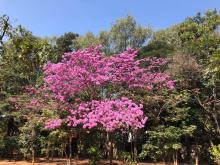
Abstract: Sarala Mahabharata, composed in the fifteenth century, is a remarkably creative retelling of Vyasa’s Mahabharata in Odia language. Sarala Das, the Aadi kavi of Odia literature, did not “translate” the classical text. He reconceptualised the ancient story of the Kuru clan at a critical period and gave expression to it in his magnum opus. His poetic vision and his deep understanding of the human situation in the world demanded modifications of various kinds in the “received” narrative. The episode about the guru dakshina (ritual fee to the teacher) of Ekalavya constitutes a good example of this.
This presentation analyses this episode from the point of view of dharma or right action. In this episode, significant questions of knowledge, power, and responsibility have been raised and explored. These include: (a) is “useless knowledge” a meaningful concept in the context of lived life?, (b) are there some who are better qualified to receive some special knowledge than others? (c) what is the teacher’s responsibility in imparting knowledge? and (d) as for the relationship between the guru and his sishya, what could be considered a model? The guru’s asking Ekalavya for his right thumb as guru Dakshina and some connected matters are discussed here, keeping these and related questions in mind. The presentation argues that the guru’s action, cruel though it was, was not without justification in that specific socio-cultural context. It is suggested here that the story may be viewed as an articulation of the relationship between the urban elite and the forest –dwellers at a certain stage.
About the speaker: Prof. B. N. Patnaik (b. 1942) is former Professor of English and Linguistics, IIT Kanpur, where he taught generative linguistics, computational linguistics, linguistic communication and English. First to study Odia syntax within the generative linguistics framework, he has published papers on topics in theoretical and applied linguistics, language and culture, discourse linguistics and Sarala Mahabharata. He is the author of Introducing Saaralaa Mahaabhaarata, Retelling as Interpretation: An Essay on Sarala Mahabharata, Language Matters, Life’s Little Tales and Connecting with the World (Essays on language, culture and communication). Among his co-edited books is Noam Chomsky’s Architecture of Language. He has created the video- course “The Tradition of Retelling of the (Vyasa) Mahabharata: An In-Depth Study of Odia Mahabharatas” and he most fondly writes a blog on Sarala Mahabharata: saralamahabharat. blogspot. com
He was Visiting faculty at IIM Calcutta, Visiting Professor at Indian Institute of Advanced Study, Visiting Fellow in the Department of Philosophy of Rajasthan University, Visiting Faculty in the Department of Comparative Literature, Jadavpur University, among others. He was Head of the Department of Humanities and Social Sciences, IIT Kanpur and a member of the Board of Governors of that Institute. He was a member of the UGC Committee for Indigenous Languages and a member of the TDIL Woking Group, Ministry of Information Technology, Government of India and is a member of the Classical Language Committee of the Government of India.
